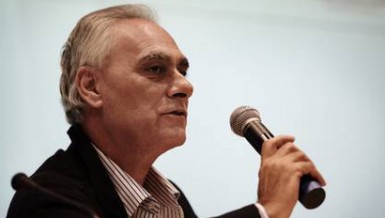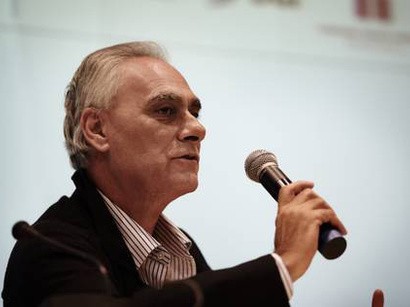
By James M. Dorsey
A football brawl in Israel’s politically most loaded derby and an alleged subsequent raid by the Israeli military on the offices of Israel’s foremost Palestinian football club reflects a hardening of the Israeli-Palestinian divide as Israel debates legislation that would emphasise the Jewish national rather than the democratic nature of the state – a move that would effectively deprive Israeli Palestinians of their identity as both Israelis and Palestinians as well as of their equal rights.
In a sign of the times, it was the Palestine Football Federation (PFA) whose authority is limited to the West Bank and the Gaza Strip that condemned the raid on the headquarters of Galilee-based Bnei Sakhnin, the only Israeli Palestinian team to have ever won the Israel Cup, rather than the Israel Football Association (IFA) of which Bnei Sakhnin is a member.
The Israeli military said the incident had not been a raid. It said a routine patrol had asked some Palestinians for their identification cards, and when they said the cards were in Bnei Sakhnin’s offices soldiers had entered the building to check their identities.
The condemnation by the PFA rather than the IFA suggests that Israeli ultra-nationalism is driving Israeli Palestinians who account for approximately 20% of the Israeli population to see their future in a Palestinian rather than an Israeli state. It is a trend that could further complicate, if not defeat, already diminishing hopes that a two-state solution – the establishment of a Palestinian state alongside Israel – is the way to resolve the Israeli-Palestinian conflict.
In fact, advocacy of Israeli Palestinian rights by institutions in the Palestine Authority headed by President Mahmoud Abbas in the absence of an Israeli willingness to stand up for the rights of all its citizens irrespective of their ethnic or religious background reinforces a growing belief that the two-state solution is dying a slow death, leaving the creation of one state that would encompass Jews and Palestinians in Israel proper, the occupied West Bank and the Gaza Strip as the only alternative.
Statements in response to the PFA condemnation by world football body FIFA president Sepp Blatter and Asian Football Confederation (AFC) president Sheikh Salman Bin Ibrahim Al Khalifa also denouncing the Israel raid signalled that Israeli policy was likely to further isolate the Jewish state and strengthen growing calls for disinvestment from and sanctions against Israel. The Boycott, Disinvestment and Sanctions (BDS) campaign is one of the Israel government’s greatest concerns. Messrs. Blatter and Salman’s condemnation coincided with a statement by the US State Department warning Israel that it should “stick to its democratic principles”.
Sheikh Salman accused the Israelis of “breaking into the PFA headquarters … a dangerous precedent that requires the international sporting family to stand together and support the PFA.” He said the AFC would work with FIFA to “study ways and mechanisms to put an end to the suffering of Palestinian football, and send a tough message to the Israeli authorities to stop its attacks on various parts of the Palestinian footballing system.”
The raid on Bnei Sakhnin’s headquarters came a day after fighting broke out at the end of the club’s match against its arch rival Beitar Jerusalem, the bete noire of Israeli football and the only Israeli team that refuses to sign Palestinian players because of its racist fan base. Beitar counts multiple right-wing Israeli leaders among its supports. Prime Minister Benyamin Netanyahu’s recent attendance of a Beitar game was widely interpreted as a possible indication that he might be contemplating early elections.
The brawl erupted after Bnei Sakhnin fans in violation of police orders smuggled Palestinian flags into the stadium and sported kaffiyahs, the chequered Palestinian scarf. Animosity between the fan bases of Bnei Sakhnin and Beitar runs deep. In recent months both fan groups have emphasised rival Palestinian and Israeli claims to Jerusalem against a backdrop of mounting tension in the city. Beitar fans sought to disrupt the match by throwing football balls onto the pitch as it was being played and subsequently ripped chairs out and destroyed bathrooms in the stadium, the only Israeli facility to have been funded by Qatar, an Arab state that has no diplomatic relations with Israel.
On the eve of the Brazil World Cup in June, Blatter sidelined Palestinian calls for sanctions against the IFA in the wake of this summer’s Gaza war and shielded FIFA from becoming the first international organisation to take action against Israel by establishing a committee that would oversee efforts to address Palestinian grievances.
The Palestinians accused Israel in a 45-page report submitted to FIFA of persistently seeking to undermine Palestinian football activity and development. The committee is expected to report back to FIFA by the end of this year. Israel has cited security concerns as the reason for restrictions on the movement of players and officials charging that some of them intended to “harm the state of Israel and its citizens”. The FIFA committee is unlikely to be able to report significant progress in the current environment despite a planned meeting in Morocco between the IFA and PFA on the sidelines of the FIFA World Cup.
Years of failed efforts by FIFA to ease Israeli restrictions on Palestinian football and establish a mechanism that would allow the Palestinian and Israeli federations to resolve problems are likely to strengthen the Palestinian efforts to persuade the football body to sanction Israel. The IFA’s failure to stand up for its own members plays into the Palestinians’ hands.
The IFA in October fined Bnei Sakhnin, long viewed as a symbol of Israeli-Palestinian co-existence, for engaging in politics by honouring a controversial Israeli Palestinian former member of parliament as well as Qatar. The sanctioning came as Israel denounced Qatar for its support of Hamas, the Islamist militia that controls the Gaza strip, and the Muslim Brotherhood.
The honouring was intended as an expression of gratitude to former Israeli member of parliament deputy Azmi Bishara for arranging funding from Qatar for the club at the height of the Gaza war. Bnei Sakhnin said it turned to Bishara for help after Israel authorities had refused to come to the club’s financial rescue.
Mr. Bishara, a close associate of Qatari emir Sheikh Tamim bin Hamad bin Khalifa Al Thani, moved to Qatar in 2007 amid suspicion that he had spied for Lebanese Shiite militia Hezbollah during the 2006 Israel-Hezbollah war.
To be fair, the IFA’s 15,000 Israeli shekel ($4,000) fine was lenient given that members of Netanyahu’s cabinet, including Culture and Sport Minister Limor Livnat and Foreign Minister Avigdor Lieberman, had called for the expulsion of Bnei Sakhnin from Israel’s Premier League.
Nonetheless, the IFA’s refusal to force Beitar Jerusalem to adhere to equal opportunity rules in its hiring policies and truly crackdown on its racist fan base rather than repeatedly slap the club with administrative punishments that have done little to change the club’s ways – coupled with the punishment of Bnei Sakhnin and the proposed legislation that would restrict Israeli democracy to the detriment of its Palestinian citizens – effectively turns Israeli pitches into potential battlefields in which the very notion of a Jewish state could be at stake.
James M. Dorsey is a senior fellow at the S. Rajaratnam School of International Studies, co-director of the University of Wuerzburg’s Institute for Fan Culture, and the author of The Turbulent World of Middle East Soccer blog and a forthcoming book with the same title



